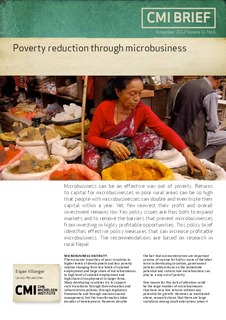| dc.contributor.author | Villanger, Espen | |
| dc.date.accessioned | 2018-01-04T08:17:45Z | |
| dc.date.available | 2018-01-04T08:17:45Z | |
| dc.date.issued | 2012-11-23 | |
| dc.identifier | oai:www.cmi.no:4642 | |
| dc.identifier.citation | Bergen: Chr. Michelsen Institute (CMI Brief vol. 11 no. 6) 4 p. | |
| dc.identifier.issn | 0809-6732 | |
| dc.identifier.uri | http://hdl.handle.net/11250/2474794 | |
| dc.description.abstract | Microbusiness can be an effective way out of poverty. Returns to capital for microbusinesses in poor rural areas can be so high that people with microbusinesses can double and even triple their capital within a year. Yet, few reinvest their profit and overall investment remains low. Key policy issues are thus both to expand markets and to remove the barriers that prevent microbusinesses from investing in highly profitable opportunities. This policy brief identifies effective policy measures that can increase profitable microbusiness. The recommendations are based on research in rural Nepal. | |
| dc.language.iso | eng | |
| dc.publisher | Chr. Michelsen Institute | |
| dc.relation | CMI Brief | |
| dc.relation | 6 | |
| dc.relation.ispartof | CMI Brief | |
| dc.relation.ispartofseries | CMI Brief vol. 11 no. 6 | |
| dc.relation.uri | https://www.cmi.no/publications/4642-poverty-reduction-through-microbusiness | |
| dc.subject | Nepal | |
| dc.title | Poverty reduction through microbusiness | |
| dc.type | Report | |
